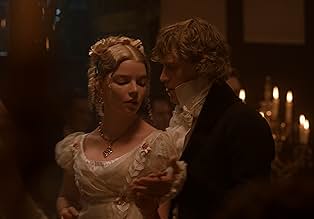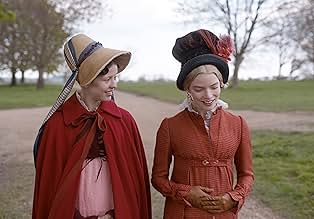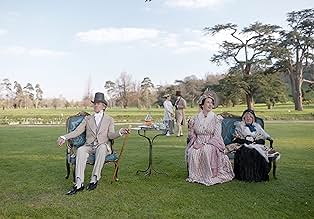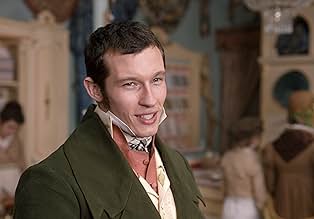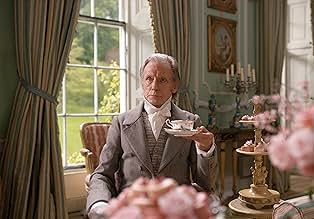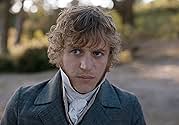En la Inglaterra del siglo XIX, una joven bien intencionada pero egoísta interfiere en las vidas amorosas de sus amigos.En la Inglaterra del siglo XIX, una joven bien intencionada pero egoísta interfiere en las vidas amorosas de sus amigos.En la Inglaterra del siglo XIX, una joven bien intencionada pero egoísta interfiere en las vidas amorosas de sus amigos.
- Dirección
- Guionistas
- Elenco
- Nominado a 2 premios Óscar
- 8 premios ganados y 53 nominaciones en total
- Dirección
- Guionistas
- Todo el elenco y el equipo
- Producción, taquilla y más en IMDbPro
Opiniones destacadas
Recently got a chance to watch this. I like the film with Gwyneth Paltrow, and absolutely love the BBC miniseries, so I was cautious watching this, especially with the several bad reviews. I don't know if it was because I went in with low expectations, but I was delighted by this movie! Admittedly if you don't know the story, it can move fast, but to be fair, the book is long and tedious, with a lot to fit in two hours, which is one of my problems with the 2008 movie. The visuals and fashions of this movie are beautiful, and Emma's character did show improvement unlike some of the comments I saw. This one definitely captured Jane Austen's humor, and you can be guaranteed to laugh a few times. The BBC mini-series is still my top rated, but the 2020 "Emma." is, in my opinion, a notch above the 2008 "Emma", but would definitely recommend all adaptations, especially the book.
This recent film rendition of Jane Austen's Emma (curiously here called "Emma." With a period) enjoyably carries the opulence of the 19th century landed gentry with a modernist modicum of biting satire. This vintage Austen is critical of the heavy-handed social manipulations toward marriage while it exudes Austen's own marriage to the time. As Virginia Woolf said, Austen "had no wish for things to be other than they are."
Slyly played by Anya Taylor-Joy, Emma's major duty in life seems to be placing her loved ones in the right marriage, occasionally delighting in a working-class connection. To her credit she seems to value love even above wealth, though her being poor herself is never an option as long as her wispy father (Bill Nighy) is responsible for her welfare: "Never could I expect to be so truly beloved and important; so always first and always right in any man's eyes as I am in my father's." (Emma)
Taylor-Joy brings a sly smile to most interchanges, as if it were Austen herself enjoying the charades and deceptions that she knows her story will set right as she sets right the appropriate human connections. The audience is always in the know as young director Autumn de Wilde gives the feel of Austen's signature style, Free Indirect Speech (FIS), a form of third-person narration which goes gently in and out of a character's mind.
More importantly, the mansion and its grounds are about as lush and painterly as ever has been shown on a period piece, and the costumes are beyond breathtaking. If you are put off by the high rhetorical style, your eye will be fully satisfied with a sumptuousness rarely seen in cinema.
When all is said, however, its live that defines this kind of romance. Johnny Flynn as George Knightly, Emma's close buddy and potential suitor, is real enough in a Steve-McQueen way to bring that modernist cadence to the stiff upper-crust motif. He and Taylor-Joy are well matched, youthful, beautiful, and hip.
De Wilde and writer Eleanor Catton have done Austen well, carrying the aura of 19th century upper-class reserve into our cynical times, attractive enough to make us think that love can be organized and life made simple. The women in Emma., even when foolish, are worthy of affection:
"Men of sense, whatever you may choose to say, do not want silly wives." Mr. Knightly
Slyly played by Anya Taylor-Joy, Emma's major duty in life seems to be placing her loved ones in the right marriage, occasionally delighting in a working-class connection. To her credit she seems to value love even above wealth, though her being poor herself is never an option as long as her wispy father (Bill Nighy) is responsible for her welfare: "Never could I expect to be so truly beloved and important; so always first and always right in any man's eyes as I am in my father's." (Emma)
Taylor-Joy brings a sly smile to most interchanges, as if it were Austen herself enjoying the charades and deceptions that she knows her story will set right as she sets right the appropriate human connections. The audience is always in the know as young director Autumn de Wilde gives the feel of Austen's signature style, Free Indirect Speech (FIS), a form of third-person narration which goes gently in and out of a character's mind.
More importantly, the mansion and its grounds are about as lush and painterly as ever has been shown on a period piece, and the costumes are beyond breathtaking. If you are put off by the high rhetorical style, your eye will be fully satisfied with a sumptuousness rarely seen in cinema.
When all is said, however, its live that defines this kind of romance. Johnny Flynn as George Knightly, Emma's close buddy and potential suitor, is real enough in a Steve-McQueen way to bring that modernist cadence to the stiff upper-crust motif. He and Taylor-Joy are well matched, youthful, beautiful, and hip.
De Wilde and writer Eleanor Catton have done Austen well, carrying the aura of 19th century upper-class reserve into our cynical times, attractive enough to make us think that love can be organized and life made simple. The women in Emma., even when foolish, are worthy of affection:
"Men of sense, whatever you may choose to say, do not want silly wives." Mr. Knightly
Emma is a subtle comedy, delving into issues of marriage, sex, age, and social status. It was the last book of hers published while author Jane Austen was still alive. About the character Emma she said, preparing to write the novel, "I am going to take a heroine whom no one but myself will much like."
Emma is 21 and privileged, she fashions herself as a matchmaker and most of the stories that develop result from this. It truly is a comedy of manners. Not slapstick comedy, the type of subtle British comedy.
This movie pretty well follows the novel and Anya Taylor-Joy to me is just perfect as Emma Woodhouse. She is a good actress but I especially love to look at her face, with her wide-set eyes and perfect lips. Strangely after she was selected to play the role she was hesitant, she said she didn't think of herself as attractive enough. In fact in an interview she said, "I have never and I don't think I will ever think of myself as beautiful. I don't think I'm beautiful enough to be in films."
Bill Nighy is very good as her wealthy father Mr. Woodhouse and as often happens when he has a supporting role, Nighy steals every scene he is in.
Good movie of a familiar story, I enjoyed it. I watched it at home on BluRay from my public library, my wife skipped.
Emma is 21 and privileged, she fashions herself as a matchmaker and most of the stories that develop result from this. It truly is a comedy of manners. Not slapstick comedy, the type of subtle British comedy.
This movie pretty well follows the novel and Anya Taylor-Joy to me is just perfect as Emma Woodhouse. She is a good actress but I especially love to look at her face, with her wide-set eyes and perfect lips. Strangely after she was selected to play the role she was hesitant, she said she didn't think of herself as attractive enough. In fact in an interview she said, "I have never and I don't think I will ever think of myself as beautiful. I don't think I'm beautiful enough to be in films."
Bill Nighy is very good as her wealthy father Mr. Woodhouse and as often happens when he has a supporting role, Nighy steals every scene he is in.
Good movie of a familiar story, I enjoyed it. I watched it at home on BluRay from my public library, my wife skipped.
Autumn de Wilde's Emma, with Anya Taylor-Joy and Johnny Flynn, is not my cup of tea, I'm afraid. My review might be influenced by how much I love Jane Austen's novel and how many times I've watched the 2009 miniseries, but I always give every adaptation a try. And I can't really judge if what I was watching would make sense to an Austen virgin, shall we say, so what seemed disjointed and rushed to me might work perfectly for others.
I'll start with the good: I loved the costumes and the interiors, which were sumptuously beautiful. The wood-shaving ringlets on the women and the high collars on the men were distracting, though. And of course Anya Taylor-Joy made for a quirky and regal Emma (Austenites will be pleased to note that she has perfect posture.) I also loved how Anya Taylor-Joy and Amber Anderson as Jane actually played the pianoforte during the Coles' party (but could have done without Mr Knightley's contribution, when Frank Churchill is supposed to be singing with Jane). BUT. The music was horrendously jarring, alternating between Hanna Barbera cartoon incidentals and freakish folk music. The supporting characters suffered once again - I couldn't honestly tell the difference between Mrs Weston, Mrs Knightley and Mrs Elton, except that Isabella was for some reason a complete cow in this version, and Mr Elton and Frank Churchill were also interchangeable (perhaps that's why Elton never seemed to be without his dog collar, to help tell them apart). Bill Nighy's Mr Woodhouse was a weird combination of fusspot and Edwardian fop, and Johnny Flynn's Mr Knightley strayed way off character by stripping off in his first scene and never really recovered for me. (Apparently, that was a way of 'humanising' the character because he is always 'mansplaining' - very woke.) Anya wasn't kidding when she talked about the focus being on 'bodily functions', by the way - not only are we 'treated' to Knightley's backside, but Emma hitches up her skirts to warm her bare arse by the fire, and the 'cannot make speeches' proposal scene is a bloody mess. Literally. The script leans so heavily on lines from the novel that I think Eleanor Catton thought she was writing an essay for an English Lit exam - Austenites will be happy, but there was no feeling behind any of the grand words. When Emma and Mr Knightley argue, they constantly shout over each other, for instance, instead of the usual playful back and forth.
The whole film felt like a weird mashup between a stage musical and a Victorian farce, with choreographed servants and slapstick humour. There was also a lot of 1996 Emma in there, taking pastel and pastoral scenery from the film and Andrew Davies' wearisome obsession with wealth from the television two-parter. Not on a sliding scale of Emma and Miss Bates, but in how Mr Knightley's strawberry picking party turns into a National Trust promotional video for Wilton House, Salisbury. There's also a lot of emphasis on servants dressing their masters and mistresses, presumably to fit in more scenes of 'natural nudity'.
I went, I watched, I did my duty to Emma. But I think I'll stick with the 2009 miniseries.
I'll start with the good: I loved the costumes and the interiors, which were sumptuously beautiful. The wood-shaving ringlets on the women and the high collars on the men were distracting, though. And of course Anya Taylor-Joy made for a quirky and regal Emma (Austenites will be pleased to note that she has perfect posture.) I also loved how Anya Taylor-Joy and Amber Anderson as Jane actually played the pianoforte during the Coles' party (but could have done without Mr Knightley's contribution, when Frank Churchill is supposed to be singing with Jane). BUT. The music was horrendously jarring, alternating between Hanna Barbera cartoon incidentals and freakish folk music. The supporting characters suffered once again - I couldn't honestly tell the difference between Mrs Weston, Mrs Knightley and Mrs Elton, except that Isabella was for some reason a complete cow in this version, and Mr Elton and Frank Churchill were also interchangeable (perhaps that's why Elton never seemed to be without his dog collar, to help tell them apart). Bill Nighy's Mr Woodhouse was a weird combination of fusspot and Edwardian fop, and Johnny Flynn's Mr Knightley strayed way off character by stripping off in his first scene and never really recovered for me. (Apparently, that was a way of 'humanising' the character because he is always 'mansplaining' - very woke.) Anya wasn't kidding when she talked about the focus being on 'bodily functions', by the way - not only are we 'treated' to Knightley's backside, but Emma hitches up her skirts to warm her bare arse by the fire, and the 'cannot make speeches' proposal scene is a bloody mess. Literally. The script leans so heavily on lines from the novel that I think Eleanor Catton thought she was writing an essay for an English Lit exam - Austenites will be happy, but there was no feeling behind any of the grand words. When Emma and Mr Knightley argue, they constantly shout over each other, for instance, instead of the usual playful back and forth.
The whole film felt like a weird mashup between a stage musical and a Victorian farce, with choreographed servants and slapstick humour. There was also a lot of 1996 Emma in there, taking pastel and pastoral scenery from the film and Andrew Davies' wearisome obsession with wealth from the television two-parter. Not on a sliding scale of Emma and Miss Bates, but in how Mr Knightley's strawberry picking party turns into a National Trust promotional video for Wilton House, Salisbury. There's also a lot of emphasis on servants dressing their masters and mistresses, presumably to fit in more scenes of 'natural nudity'.
I went, I watched, I did my duty to Emma. But I think I'll stick with the 2009 miniseries.
Based on a timeless novel Emma by Jane Austen, this latest movie adaptation of her book is a beautiful, gorgeous and entertaining re-make that should easily please Austen fans old and new as it looks phenomenal. Its cast, led by the terrific and wonderful Anya Taylor-Joy, are/is utterly splendid. "Emma's" script is adapted by novelist Eleanor Catton (The Luminaries) and manages to capture much of Austen's own comedy, translating it elegantly to the screen. The result is a stylish and eminently watchable movie adaptation. In addition to the script, the production values are stellar, while movie is visually stunning and impeccably researched - it really felt like an authentic window into the 1800s. At the end, film - updated in all the right ways - is filled with an abundance of genuine charm. For those who are fans of the period drama this is a must see, while this gentle film, also, deserves to introduce Austen to a whole new generation.
Rating: 7+/8-
Rating: 7+/8-
¿Sabías que…?
- TriviaAll of the music performances in the film are real, played by the actors in character. None is staged.
- ErroresThe Sequence subtitled Winter begins with a carriage drawing up in front of a large tree in full leaf.
- Citas
Miss Bates: Mother, you MUST sample the tart!
- Créditos curiososThe film's title has a period at the end, meant to signify the movie as a "period piece" set in the original era.
Selecciones populares
Inicia sesión para calificar y agrega a la lista de videos para obtener recomendaciones personalizadas
- How long is Emma.?Con tecnología de Alexa
Detalles
- Fecha de lanzamiento
- Países de origen
- Sitio oficial
- Idioma
- También se conoce como
- Emma
- Locaciones de filmación
- Productoras
- Ver más créditos de la compañía en IMDbPro
Taquilla
- Presupuesto
- USD 10,000,000 (estimado)
- Total en EE. UU. y Canadá
- USD 10,055,355
- Fin de semana de estreno en EE. UU. y Canadá
- USD 234,482
- 23 feb 2020
- Total a nivel mundial
- USD 26,314,547
- Tiempo de ejecución
- 2h 4min(124 min)
- Color
- Mezcla de sonido
- Relación de aspecto
- 1.85 : 1
Contribuir a esta página
Sugiere una edición o agrega el contenido que falta







